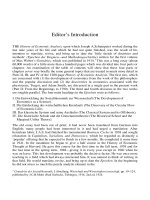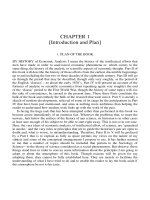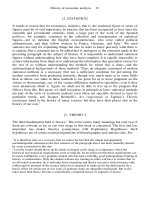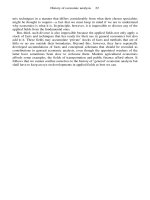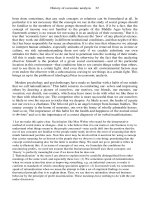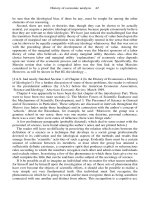History of Economic Analysis part 47 ppt
Bạn đang xem bản rút gọn của tài liệu. Xem và tải ngay bản đầy đủ của tài liệu tại đây (66.85 KB, 10 trang )
Hartley’s work (1791) and re-expounded with brilliant efficiency by our own colleague
James Mill:
3
the mind, a Lockian blank; psychic life, a mechanical system of
associations. Even J.S.Mill felt unable to rest content with this, and A.Bain was to
combine it with Darwinian elements and elements derived from the German
physiological psychologists into something that was pretty far removed from
associationist orthodoxy. But for us the question arises: since this associationist
orthodoxy was part of Benthamite orthodoxy, shall we not expect that it influenced the
economics of the group that was another part of it? Of course, we shall—but we shall be
disappointed. The case illustrates very well the nature of the relation of a comprehensive
system to its parts. Psychological associationism agrees all right with the utilitarian
philosophy or the utilitarian theory of ethics or of behavior in general and in this sense
does implement the rest. But if, on the strength of this, we proceed to examine James
Mill’s little treatise on economic theory, we find that its propositions are completely
independent of associationist psychology and are just as compatible with any other:
though a province of the Benthamite empire, the economics of the utilitarians was a self-
governing province that could have lived equally well if severed from the empire. This
verifies a result already arrived at in other connections.
4
The only thing that needs to be added is evolutionist psychology. As has been mentioned,
both Darwin and Spencer faced the problem of the manner in which the human mind
acquired each ‘mental power’: they attempted to construct genetic theories of ‘instincts,’
emotions, curiosity, memory, attention, beliefs, moral sense, social virtues, and the like. It
should be observed that such endeavors are not psychology in the ordinary sense: for
example, analysis of the faculty of ‘memory’ is one thing, and a hypothesis on how we
came to have this faculty is another thing. However, genesis may suggest truly
psychological theories, and it is understandable that Darwinian influence began to assert
itself in professional psychology before long. Economists, however, did not take to this
line of research, though it has obvious bearings upon problems of economic behavior and
of its malleability, say, in a socialist organization of society—something worth
pondering!
3
Analysis of the Phenomena of the Human Mind (1829).
4
Observe, in particular, that the same thing also holds for Hume: his economics has nothing
whatever to do with either his psychology or his philosophy. And so for Locke. On the other hand,
the relation of associationism to utilitarian economics is complicated by the fact that Bentham’s
own economics differed from the economics of the other utilitarians who were his followers in
everything else.
History of economic analysis 422
[(b) Logic, Epistemology, and Cognate Fields.]
In these fields
5
substantial advance would have to be reported both as to philosophical
foundations (Kant; Hegel’s Logic is not logic in any technical sense though relevant to it
in several points) and as to formal and practical developments (Lotze, De Morgan). From
our standpoint, it is important to mention the work of a man who holds a key position in
the history of the fields within our range of vision, Richard Whately
6
(Anglican
archbishop of Dublin). And of great significance for the picture of that period’s Zeitgeist
is the effort made by another key man to realize a desideratum that has been formulated
again and again—in our own day, by J.Dewey—to bring logic nearer to the actual
procedures of science: Whewell’s History of the Inductive Sciences (1837).
7
The program
of modern
5
If we may call mathematics a cognate field, it was the one that made the biggest strides. About
these nothing can be said here except that this period—following as it did upon the ‘heroic age of
mathematics’ in which the excitement of pioneer discovery had all but crushed the interest in
logical foundations and in critical analysis of concepts and methods—laid the groundwork of
modern (rigorous) mathematical reasoning. But a few data on probability must be mentioned,
owing to the importance of the subject for statistics and for economic theory. Laplace’s Théorie
analytique des probabilités was first published in 1812; his Essai philosophique (which is quite
eighteenth century, however) in 1814; Poisson’s famous Recherches in 1837; Cournot’s Exposition
de la théorie des chances et des probabilités in 1843; P.L.de Tchebycheff’s paper (‘Des Valeurs
moyennes’ in Liouville’s Journal de mathématique, pure et appliquée), 1867; Venn’s Logic of
Chance (often invoked by Edgeworth) in 1866. Fechner’s Kollektivmasslehre (1897) belongs in
this period though not chronologically. The same applies to J.von Kries’s Principien der
Wahrscheinlichkeitsrechnung (1886). The Cournot of probability is the great economic theorist (see
below, Part IV, ch. 7, sec. 2). My high opinion of his theory of random events is a layman’s
opinion. But it was shared by the late Professor Czuber of Vienna.
6
Elements of Logic, which appeared originally as an article in the Encyclopaedia Metropolitana
(1826). For his work in economics, see ch. 4 below.
7
William Whewell’s (1794–1866) powerful and masterful personality belongs to, and illustrates at
its best, that class of scientific men whom we have called Academic Leaders: he was a peerless
influence in Trinity College and in Cambridge generally, one of those environment-creating
individuals who belong in the history of science even if they never wrote a line. Such was not
Whewell’s case, however. The History is not only a work of erudition but a live source of
inspiration (so it was to J.S.Mill), though his Philosophy of the Inductive Sciences (1840) is
disappointing (at least, so it is to me) and though his Elements of Morality including Polity (1845)
has been deservedly forgotten. He was also something of an economist. His Lectures (1852 and
1862) do not, it is true, amount to much, though he was far too able ever to be quite uninteresting.
But he displayed sense for quality by editing the works of Richard Jones (see below, chs. 5, 6) and
a touch of originality by making an attempt that no commonplace mind would have made in his
day, viz. to express mathematically a few propositions of the economic theory of his time (3rd vol.
of the Cambridge Philosophical Transactions). This effort does not go beyond stating in symbols
what had already been stated in
The Intellectual scenery 423
empiricist logic—as taught by the Vienna positivists such as Carnap, Frank, Richard von
Mises, Schlick—is to analyze scientific procedure and to do away with, as not only
irrelevant but meaningless, everything else, especially all ‘metaphysics.’ Whewell was, of
course, far removed, subjectively, from either this program or the conceptual constructs
with which it is being implemented. But, objectively speaking, his book, owing to the
influence it exerted on Mill’s Logic, is a landmark on the long road that leads toward
logical positivism.
[(c) J.S.Mill’s Logic.]
These scanty remarks have prepared us for a discussion of the work in which we are
primarily interested. From our standpoint, J.S. Mill’s Logic must hold a place of honor,
not only because we claim the author for our own, not only because we economists are
much more likely to turn to it than to any other methodological treatise of that time, but
also because it was one of the great books of the century, representative of one of the
leading components of its Zeitgeist, influential with the general reading public as no other
Logic has ever been. A less striking patch of color in our picture than is the Origin of
Species, it is hardly a less indispensable one—although it does not stand out, as does the
Origin of Species, when we look back on the historical sequence of performances and
ideas that produced the situation of today in the respective fields, and although Mill’s
8
book is dead in a sense in which Darwin’s is not.
The best way of explaining, to economists, the nature of Mill’s
performance is to point out the family likeness that exists between his
Logic and his Principles of Political Economy, which will be fully
discussed in the appropriate place below (ch. 5). With admirable modesty,
Mill disclaimed, in both cases, any pretense ‘of giving the world a new
theory of intellectual operations’ or of economic processes (see the
prefaces to the first editions of both books). In both cases, his aim was
words and therefore does not really constitute mathematical economics (there is no
mathematical reasoning). But his rudimentary demand analysis, considering its
date, does not quite deserve Jevons’ contemptuous verdict that has since been
repeated many times. All this is mentioned here because the brevity of our sketch
will not permit notice of performances such as Whewell’s in their appropriate
places.
8
J.S.Mill, A System of Logic, Ratiocinative and Inductive, being a Connected
View of the Principles of Evidence and the Methods of Scientific Investigation
(1843). One has in mind the success of this book, as much as or more than the
success of its author’s Political Economy, when one speaks of Mill’s sway over
the generation of English intellectuals that entered upon their careers in the 1850’s
and 1860’s. Abroad, part of the reading public was impervious to such influence.
But the rest embraced Mill’s message with even greater enthusiasm. The book was
found in the house of a peasant in Ireland. It was called the ‘book of books’ by an
accomplished Viennese woman (a Fabian and suffragist) who felt herself to be
progress incarnate. It occupied a place of honor not much below Plato’s in the
mind of at least one philological philosopher I knew as a boy—all of which I say
in order to convey, first, that the book was a living force in bourgeois civilization
History of economic analysis 424
and, second, that the correlation between individuals’ enthusiasm for it and their
competence to judge it was not quite satisfactory.
to co-ordinate existing elements of knowledge, to develop them, and,
as he liked to put it, ‘to untie knots’ (scilicet in existing strings). In neither
case did he succeed completely; but in both he did eminently useful work,
work that was perhaps all the more pregnant with suggestions because it
contained stimulating discrepancies of doctrine.
Both works, besides being of the same class of performance, reveal in a
similar manner the mental stature and the—shall I say ‘moral’?—
propensities of their author. Within the range of his comprehension, he
was eminently fair and fully resolved to open the doors of his mind to
ideas of widely different origin—in the Logic he went so far as to pay (via
a quotation from Condorcet) a well-deserved compliment to scholastic
performance. He was ‘matter of fact’: though his mind was not ‘practical’
in every sense of the word, he was always ‘practical’ and even pragmatist
in intention, the practically useful result attracting him before everything
else. In the case of the Logic, his practical purpose was to analyze
scientific procedures with a view, first, to establishing their validity (‘to
appraise evidence’) and, second, to developing rules that might inspire or
guide research. This makes it very difficult to describe his fundamental
standpoint or standpoints in terms of modern ‘empiricist’ and ‘positivist’
logic, for the problems and methods that are characteristic of the latter and
divide its staff of workers (especially in the Grundlagenforschung of
mathematics) were largely beyond his ranges of vision and interest.
(Wherefore it is unjust, by the way, to criticize from a modern standpoint
occasional utterances of his that seem to be relevant to modern
controversies.) But this essentially practical purpose of the Logic also
renders it difficult to describe Mill’s fundamental views in terms of older
philosophies. The significance of the Kantian revolution he hardly
grasped. In a general way, it may be said that his philosophy had its roots
in the English empiricism of the Locke-Hume tradition and, in particular,
that it had an associationist psychological background. But I believe,
though I cannot prove here, that neither statement is entirely correct. In
any case, Mill was not narrowly empiricist or narrowly associationist:
Hartleyan associationism comes in for criticism in the Logic, especially at
a strategic point in Book VI.
The purpose of the book almost makes it a complement of Whewell’s,
to which in fact it owes much. Let us put it like this: Mill’s Logic is
primarily a theory of scientific knowledge (inference), essentially
theoretical as compared with Whewell’s book and still more so as
compared with any treatise on any individual science; but it is primarily
The Intellectual scenery 425
practical as compared with any treatise on pure logic or pure
epistemology (which were, however, pretty much one and the same thing
for Mill). As regards logical fundamentals, Mill leaned heavily on
R.Whately even where he dissented from him.
9
Cautious and noncommittal as Mill was with reference to certain points
of philosophical fundaments, modest as he was with reference to his
personal contribution, in one respect he was neither cautious nor modest:
exactly as in his Political Economy, in a manner that strikes us as
curiously naïve, he cheerfully claimed an entirely impossible degree of
finality for the results he expounded. He seems to say to us: why, I have
collected and systematized the best ideas of this enlightened age, the
principles either promulgated or conformed to by its ablest thinkers—
what more can there possibly be left to do? His confident teaching fared in
logic much as it did in economics.
Book I, ‘Of Names and Propositions’ (including Classification and
Definition), in which there are passages almost suggestive of modern
‘semantics,’ and Book II, ‘Of Reasoning’ (Syllogisms; Deductive
Sciences, which Mill holds are really inductive in so far as their premisses
are derived by a process of induction from experience), cover ground on
which Mill felt that the going was easy: for him who hardly ever looked
below the surface, no serious problem arose to bar the way. He felt
differently about the ground covered in Book III, ‘Of Induction’ (or
generalization from experience, the core of scientific procedure and the
core of Mill’s performance). It contains the axiom of the uniformity of the
course of nature, his theory of valid induction that is derived from it, his
philosophy of causation, his famous ‘four methods’ (of Agreement, of
Difference, of Residues, of Concomitant Variations), all of which is partly
marred by faults of thought or exposition that can be explained on only
one hypothesis: that even there, though writing on subjects that gripped
him intensely, he wrote as he always did—in haste. But precisely because
of this, substantial improvement can be effected in several cases without
injury to his main positions. On the whole, there cannot be any doubt that
Book III constitutes one of the great contributions to the theory of
scientific knowledge. The many points of interest in the essentially
subsidiary Books IV and v must be passed by, but Book VI, ‘On the Logic
of the Moral [Social] Sciences’ is of first-rank importance to us. It should
be perused together with Mill’s older (pre-Comtist) essay on the method
of economics (1836) that has been included in the volume on Some
Unsettled Questions.
9
Another revealing reference in the Logic (and in the Examination of Hamilton) is
to Dr. Thomas Brown’s Lectures on the Philosophy of the Human Mind, which,
edited after Brown’s death (1820), had a most successful career. The interesting
point is that this Scottish physician and philosopher, though he accepted
sensationalism to a large extent, never abandoned ‘intuitive’ knowledge and had
no empiricist theory of causation. The significance of Mill’s strong
History of economic analysis 426
recommendation of the book is not entirely destroyed by his qualifying objections
to its argument.
In order to do justice to this methodology of the social sciences, two
things must be borne in mind. First, as an inevitable consequence of more
fundamental shortcomings of Mill’s general epistemology, there are many
things in Book VI to which objections may be raised. But they do not
impair its argument very much. Thus, his extension of the methods of the
physical to the social sciences, including the concepts of scientific
law and of causation, are not nearly as objectionable as one might think
because he watered down physical causation so radically as to make its
extension to the social sciences practically harmless: his ‘naturalism’ was
naturalism with its teeth pulled. Second, we must not forget that the fame
and influence of Mill’s work gave wide currency to his views so that
much that reads trite and stale—like quotations from Hamlet—does so by
virtue of his own achievement.
When all this is borne in mind, nothing remains but admiration. In a
running battle with Comte, Mill triumphantly vindicated the actual
procedure of economists while conceding—in fact, absorbing—all that
should be conceded or absorbed. The standard method of economics was
what he called the Concrete Deductive Method supplemented by the
Inverse Deductive or Historical Method for research into historical
changes of the social set-up as a whole. Had this been properly
appreciated, the pointless later squabble of economists over induction
versus deduction would have been avoided. The ‘purely theoretical’ set of
problems was taken account of by his ‘abstract or geometrical’ method,
the misuse of which for direct application to practical problems he made
the target of scathing
10
criticism. The ‘empirical laws,’ nicely divided into
uniformities of coexistence and uniformities of change, are assigned a
place with which we can find but little fault. The impossibility of
universally applicable, practical maxims was fully recognized as was the
necessity of studying actual human behavior in all its local and temporal
varieties—which should have taken off the curse from the economic man
for all times. The axiomata media of his Ethology offered suggestions that
are not fully exploited even now. The distinction that had to be fought for,
sixty years later, between the problems of the effects that follow from a
given cause under given social conditions and the problems of the ‘laws’
that determine those social conditions themselves is there. In fact, Mill
unfolded a program that harnessed the purest of pure theory and the most
concrete of institutional research into peaceful co-operation and this
10
This adjective is I think justified, though Mill’s invariable courtesy, in some cases reinforced by
filial respect, made him tone down his wording. It will read surprisingly but can be strictly proved
that the methodological doctrine that Mill preached does not differ at all from the position
eventually (though not at first) adopted by Schmoller.
The Intellectual scenery 427
without emasculating either. Of course, Jevons reads fresh and
stimulating even where he utters a platitude; Mill never reads fresh and
stimulating even where he speaks valuable wisdom. That was the fault of
his early training. But as regards this Book VI, though it contains nothing
that was not said better later on—for example, by the elder Keynes—I
conclude with advice to the reader to go back to it.
6. PRE-MARXIAN SOCIALISM
In Chapter 2 above, we have said almost nothing about the socialism and the socialist
groups or movements of the period. Painting in the large, we
had hardly an opportunity for doing so. The omission can be repaired in a few words.
1
The second half of the eighteenth century produced a number of isolated socialist (or
semi-socialist) writings but, before the French Revolution, nothing that can be called a
movement. The French Revolution itself was bourgeois in origin, character, and
ideology. The disintegration after 1791 of both its political set-up and its political thought
was, however, associated with a literature that, though of very little importance in itself,
was both indicative of a more than momentary socialist humor in a sector of the
intellectual world of France, and instrumental in keeping it subterraneously alive during
the Napoleonic regime. This provided a basis for the burst of propagandist activity,
literary and other, of a socialist (or semi-socialist) nature that we observe in France until
the advent of the second empire.
2
The revolution of 1848, though also bourgeois in
origin, was quickly to show the existence of a sort of general staff of a revolutionary
socialist army and even the existence of more or less definite plans for running a socialist
state. Frightened to death, bourgeois groups did what Louis XVI could never be prevailed
upon to do, that is, they suppressed the revolution by military force before it was too late.
Thus, France holds priority in time as regards modern socialist literature; and among the
business classes of all countries, the French business class was during that period the only
one to face socialist revolution as a serious possibility. English Chartism, both in 1836–9
1
The interested reader has at his command plenty of sources of further information from which to
supplement the jejune remarks that follow. He must remember that, from the standpoint of the aims
of this book, we are not directly interested in social movements and their ideologies per se. In this
particular case, brevity is excused in addition by the fact that our statements in this paragraph are
not controversial. For general reference, Professor Alexander Gray’s Socialist Tradition (1946) is
recommended.
2
The literary component of the movement supplied, however, part of the ideas of the socialisme
autoritaire of Napoleon III, as has been mentioned already, just as socialist and semi-socialist
workmen supplied part of the political support that raised him to power.
History of economic analysis 428
and 1840–48,
3
never amounted to anything like that, although it had a basis in early trade
union organization that made it more serious in another and more fundamental sense. The
only other socialist labor movement of importance was the German one that produced
two organized parties: Lassalle’s Allgemeiner Deutscher Arbeiterverein (1863) and
Bebel’s and Liebknecht’s Socialdemokratische Arbeiterpartei (1869), which
amalgamated in 1875.
4
The foundation and career of the First Inter-national (1864) is
mentioned here only because of Marx’s famous Inaugural Address.
5
[(a) Associationist Socialism.]
Now, the one thing that is important for us to keep in mind is that the Marxist phase of
socialist thought did not dawn before the beginning of the subsequent period.
6
The
socialism of the period under discussion was non-Marxist and associationist.
7
This term
is to denote all the varieties of socialist planning that adopt the principle of running
production by workmen’s associations—of social reconstruction through producers’ co-
operatives. Associationist socialism is, therefore, extra-scientific, because it does not
concern itself primarily with (critical) analysis—as does Marxism—but with definite
plans and the means of carrying them into effect. In addition, associationist socialism is
unscientific because these plans involve assumptions about human behavior and
administrative and technological possibilities that cannot stand scientific analysis for a
moment. On both counts, Marx was quite justified in including associationist writers in
his category of
3
The People’s Charter itself, it should be remembered, was drawn up by William Lovett and
Francis Place, the Bentham disciple, and was Benthamite and not at all socialist. In fact, its ‘six
points’ embody nothing but radical parliamentary reform.
4
Neither A.Bebel’s nor W.Liebknecht’s achievements come within the scope of this book. But the
exploits of Ferdinand Lassalle (1825–64; the reader’s attention is called to the biography by George
Brandes, there are also several others) in sociological and economic analysis cannot go
unmentioned though there will be no occasion to refer to them again. A highly cultivated man of
brilliant abilities and indomitable energy, he was first and last a man of action whose intellectual,
let alone scientific pursuits—though always attended to with zest—were always secondary to the
excitements of a fascinating life. An exception should be made, perhaps, for his most finished
performance, Das System der erworbenen Rechte (1861), a brilliant piece of legal sociology that
dazzled many a professional jurist. However, if we do make this work an exception and if we do
assume that it was the product of genuine concentration, then we must also recognize that, along
with very considerable philosophical and legal learning and strong critical ability, it displays lack
of originality. His other writings display the same lack of originality, but unrelieved by learning,
though still coupled with ability far and away above the common run of writers, socialist or other.
The three most important economic publications, the Arbeiterprogramm (1863), the Offenes
Antwortschreiben (1863), and Herr Bastiat-Schulze von Delitzsch, der ökonomische Julian (1864),
are all of them brilliant pamphlets that embody, so far as analysis is concerned, a somewhat
superficial but ably exploited Ricardianism—which accords with Lassalle’s own view inasmuch as
he described the only economics that seemed worth while to him as an ‘immanent development’ of
Ricardo’s teaching. This, by the way, is all his theory has in common with Marx’s. To describe
Lassalle either as a popularizer or as a disciple of Marx is quite erroneous. As regards agitatorial
tactics and practical proposals, he was the very antipode of Marx—which is what caused the schism
that impeded the progress of German political socialism until 1875 (Gotha Congress), when to
Marx’s infinite disgust, fusion was accomplished on a program that made large concessions to
Lassalle’s views.
The Intellectual scenery 429
5
But no Marxist will take pride in this particular performance. Its contents reveal the effects of
compromises that were perhaps inevitable but were of the sort that roused Marx’s wrath when
indulged in by other people. In fact, it was—as Marx himself pointed out with a mixture of humor
and bitterness—thoroughly un-Marxist.
6
Let me point out at once that, so far as analysis is concerned, the Marxist phase not only began
but also ended with the subsequent period. This statement may seem surprising because we attach
quite naturally high importance to the further revivals of Marxism in Russia and New York. But it
will be substantiated below (Part IV, ch. 5, sec. 8).
7
The term is convenient and I beg leave to use it, although I am aware of the awkwardness
involved in using the same phrase in the same book in two entirely distinct meanings
(psychological associationism—socialist associationism).
Utopian Socialists
8
and in fighting them bitterly. For he realized that they were
discrediting serious socialism. By 1840, they had in fact succeeded in imparting to the
very word Socialism a connotation of freakishness that helps to explain the attitude
toward it that was specific to French economists:
9
to them, and not without reason,
socialism came to mean two things, violence and nonsense. Some of the ‘utopist’ ideas
were in fact unalloyed nonsense—in several cases, definitely pathological nonsense—and
hardly any of them can be taken quite seriously, though an exception should perhaps be
made in favor of L.Blanc (1811–82).
10
For us this is indeed not quite enough to warrant
our neglecting them: freaks and dreams may yet enshrine sound pieces of analysis.
Search undertaken in this spirit, however, yields but meager results. Not that we do not
find sound reasoning and sound observation here and there; but most of what there is of it
is trivial. Hence I shall mention only the outstanding examples of Robert Owen (1771–
1858) and Charles Fourier (1772–1837),
11
who with Saint-Simon shared in a huge wave
of American enthusiasm.
8
Marx described as utopian any form of socialist thought but his own, which he called ‘scientific.’
The defining characteristic of his scientific socialism is, however, the scientific proof of the
inevitability of socialism, so that with him the phrase ‘utopian’ should not have meant the same as
‘not serious,’ though it did. By a ‘bourgeois economist,’ Marx denoted an economist who fails to
see this inevitability or, much more restrictively, an economist who believes in indefinite survival
of the capitalist order. If the reader observe that these definitions do not coincide with the meanings
usually attached to the terms, he will save himself many misunderstandings.
9
Engels attributed the fact that Marx chose Communist instead of Socialist for use in the title of the
Marx-Engels manifesto to Marx’s dislike of a term that had acquired a flavor of ‘respectability.’ It
is more likely, however, that Marx disliked it because it had acquired a flavor of oddity.
10
Louis Blanc (Organisation du travail, collected articles first published in 1839) was no doubt
also an associationist of humanitarian and rhetorical propensities that earned him semi-benevolent
contempt from later critics, bourgeois and socialist. But his proposals differed from, say, Owen’s
by an element of practicability that shows especially in the more than supervisory role assigned to
the bureaucracy (state). This element suggests possible influence upon Lassalle. Blanc once made
the proposal that emerged again with some socialists, in and after 1930, to hand over to workmen
factories that had closed down. Distribution according to the principle ‘to everyone according to his
needs’ was a pet idea of his (though not adhered to), and he may be responsible for its currency
among the socialists of his and a later time.
11
The interested rearder will find bibliographies of (and on) both in any work of reference. As
regards Owen, there was good reason for the emergence of a large literature about him for, quite
independently of his plans and experiments of the New Harmony type, his ideas as well as his
practice were of seminal importance in very many different ways that had little to do with one
History of economic analysis 430
another. Thus, his fundamentally paternalistic measures at New Lanark created a model for the
labor policy of the modern large-scale concern and, more important than this, initiated a new
attitude toward wage questions. His emphasis on the value of strikes and trade unions versus
political action makes him a classic in the history and theory of trade unions. His ideas on artisans’
co-operatives have made him the patron saint of one of the significant move ments of that and a
later time. Not only was ‘moral grandeur’ (Torrens) his but
This is our opportunity for a glance at the American (and not only U.S.) Social-Science
Movement.
12
The word Science, when used in connection with this movement, must be
taken in a sense akin to the one it carries in the phrase Christian Science rather than in the
usual one, for there was little genuinely scientific effort. A society that produces a
comparatively prosperous stratum more quickly than it produces a cultural tradition is
open to unbalancing infiltrations of ideas, even apart from the influence of physical
immigration. A small number of people enjoyed leisure—‘lettered ease’ it was with
some—and had open minds, which compensated shrewdness in business by enthusiasms
and radicalisms, as generous as they were uncritical, in everything else. One of the most
characteristic of these enthusiasms was the layman’s enthusiasm for ‘science’—and
especially for social alchemy because, to the untrained mind that vibrates with
unemployable energies, the real thing is not half so exciting as is the fake. This is the
sociology of the movement. Its real importance for the impulse it gave to American
economics and sociology is as difficult to appraise as is the real importance for serious
research of the romanticist movement in Europe, of which, in fact, the social-science
movement may be interpreted as the specifically American counterpart. I can see no
relation between it and the performances that eventually established both economics and
sociology in the United States, and am inclined to think that its petering out around the
epoch of the Civil War was more favorable to social research than was its emergence. But
the reader will easily see all that can be adduced for the opposite view.
But how can we account for the presence of sponsors of associationism whose claims to
being taken seriously are not open to doubt? Well, for one thing, there is the influence of
the literary fashion that the French associationists certainly succeeded in creating. For
another thing, there is the support that associationist socialism as a plan for
comprehensive social reconstruction derived—quite illogically, of course—from the
actual co-operative movement and its literature. Both these elements will, I think, account
for the asso-
also, within the sphere of thought and action defined by our examples, sound and even shrewd
common sense (as his own business success suffices to prove). But as soon as he stepped out of this
sphere, which was truly his own, his complete lack of analytic ability of the more subtle kind
showed up immediately. Neither his ideas of the Labor Note that was to replace ‘money’ nor his
ideas of an Equitable Labor Exchange are nonsense in themselves, but he just did not know how to
protect his case against the most obvious criticisms.
As regards Fourier, the reader is referred to the one really enlightening item I have come across in
the large literature about him: E.S.Mason’s ‘Fourier and Anarchism,’ Quarterly Journal of
Economics (February 1928). Two points must be made: first, Fourier did base his plan (of which
the Brook Farm colony was the most famous embodiment) upon an elaborate analysis of human
nature, in general, and of the nature of society, in particular, but it was all conceived in the worst
style of eighteenth-century speculation; second, his phalanstère organization has but a qualified
The Intellectual scenery 431



